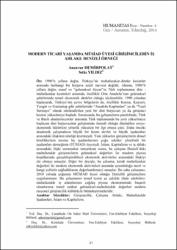| dc.contributor.author | Demirpolat, Anzavur | |
| dc.contributor.author | Yıldız, Sıtkı | |
| dc.date.accessioned | 2017-06-05T13:16:46Z | |
| dc.date.available | 2017-06-05T13:16:46Z | |
| dc.date.issued | 2014 | |
| dc.identifier.uri | https://hdl.handle.net/20.500.11776/1330 | |
| dc.description.abstract | 1990’lı yıllara değin, Türkiye’de muhafazakar-dindar kesimler arasında herhangi bir burjuva sınıfı mevcut değildi. Aksine, 1980’li yıllara değin, esnaf ve “geleneksel tüccar”ın Türk toplumunun dini - muhafazakar kesimleri arasında, özellikle Orta Anadolu’nun geleneksel şehirlerinde temel ekonomik aktörler olduğu söylenebilir. 1990 yılından başlayarak, Türkiye’nin çevre bölgelerin de, özellikle Konya, Kayseri, Yozgat ve Gaziantep gibi şehirlerinde “Anadolu Kaplanları” ya da “Yeşil Sermaye” olarak nitelendirilen yeni bir dini burjuvazi ya da girişimci kesimi yükselmeye başladı. Sonrasında, bu gelişmelerin paralelinde, Türk ve Batılı akademisyenler arasında Türk toplumunda bu yeni yükselmeye başlayan dini burjuvazinin gelişiminde önemli olduğu düşünülen sosyoekonomik faktörlere yönelik yükselen bir ilgi ortaya çıktı. Daha önceki akademik çalışmaların büyük bir kısmı devlet ve büyük işadamları arasındaki ilişkinin niteliği üzerineydi. Yeni yükselen girişimcilerin dinsel kimliklerinin tersine bu işadamlarının çoğu seküler yönelimli bir işadamları derneğinin (TÜSİAD) üyesiydi. İslam, Kapitalizm ve iş ahlakı arasındaki ilişki sorunsalını tartıştıktan sonra, bu çalışma Denizli’deki muhafazakâr girişimcilerin geleneksel değerleri ile modern piyasa koşullarında gerçekleştirdikleri ekonomik aktiviteler arasındaki ilişkiyi ele almayı amaçlar. Diğer bir deyişle, bu çalışma, kendi muhafazakar değerleri ile modern ekonomik aktiviteleri arasında uyumluluğu nasıl ve hangi yollarla sağladıklarını değerlendirmeyi amaçlar. Bu saha çalışması, 2010 yılında çoğunun MÜSİAD üyesi olduğu Denizlili girişimcilere uygulanmıştır. Bu çalışmanın temel tezini şu şekilde ifade edebiliriz: muhafazakâr iş adamlarının çağdaş piyasa ekonomisinde başarılı olmalarının temel nedeni geleneksel-muhafazakâr değerleri modern rasyonel girişimcilik kültürüyle bütünleştirmeleridir. | en_US |
| dc.description.abstract | Until the 1990s, there had not been any bourgeoisie class among conservative – religious members of Turkish Society. Rather, it could be claimed that until the 1980’s both the tradesman and ‘traditional merchants’ had been the essential economic actors among the conservative –religious groups of Turkish society, especially in the traditional cities of central Anatolia. From 1990 onwards, there has been a rise of a new religious bourgeoisie or entrepreneurs, named as “Anatolian Tigers” or “Islamic Capital”, in the peripheral regions of Turkey, especially in such cities as Konya, Kayseri, Yozgat, Denizli and Gaziantep. Afterwards, in line with these developments, there has been a rising concern among the Turkish and Western academicians about the socio-economic factors which were considered as crucial for the development of this newly rising religious bourgeoisie in Turkish society. Previous academic studies were mostly on the nature of the relationship between the state and the big businesses in Turkish society. In contrast to the religious identities of the newly emerging entrepreneurs, most of them are the members of a far more secularly oriented business association, that is MÜSİAD. This study aims to evaluate the relationship between the traditional values of the conservative entrepreneurs of Denizli, and their economic activities performed in the modern market conditions after discussing the problem of the relationship between Islam, Capitalism, and work ethics. In other words, this study aims to evaluate how and through which ways these entrepreneurs harmonize their conservative values with their modern economic activities. This fieldwork was conducted in 2010 to the entrepreneurs of Denizli, most of which were the members of the MÜSİAD. The main thesis of this study is as follows: the success of the conservative entrepreneurs in Turkey, as observed in the case of Denizli, results from their ability to integrate their traditional – conservative values with the rational culture of modern entrepreneurship. | en_US |
| dc.language.iso | tur | en_US |
| dc.publisher | Namık Kemal Üniversitesi, Fen-Edebiyat Fakültesi | en_US |
| dc.rights | info:eu-repo/semantics/openAccess | en_US |
| dc.subject | Girişimcilik | en_US |
| dc.subject | Çalışma Ahlakı | en_US |
| dc.subject | Muhafazakâr İşadamları | en_US |
| dc.subject | İslam ve Kapitalizm | en_US |
| dc.subject | Entrepreneurship | en_US |
| dc.subject | Work Ethics | en_US |
| dc.subject | Conservative Entrepreneurs | en_US |
| dc.subject | Islam and Capitalism | en_US |
| dc.title | MODERN TİCARİ YAŞAMDA MÜSİAD ÜYESİ GİRİŞİMCİLERİN İŞ AHLAKI: DENİZLİ ÖRNEĞİ | en_US |
| dc.title.alternative | THE WORK ETHICS OF THE MÜSİAD MEMBER ENTREPRENEURS IN THE MODERN ECONOMIC LIFE: THE CASE OF DENİZLİ | en_US |
| dc.type | article | en_US |
| dc.relation.ispartof | HUMANITAS - Uluslararası Sosyal Bilimler Dergisi | en_US |
| dc.department | Tekirdağ Namık Kemal Üniversitesi Dergileri | en_US |
| dc.authorid | 104358 | en_US |
| dc.identifier.volume | 2 | en_US |
| dc.identifier.issue | 4 | en_US |
| dc.identifier.startpage | 87 | en_US |
| dc.identifier.endpage | 108 | en_US |
| dc.relation.publicationcategory | Makale - Ulusal Hakemli Dergi - Kurum Öğretim Elemanı | en_US |



















